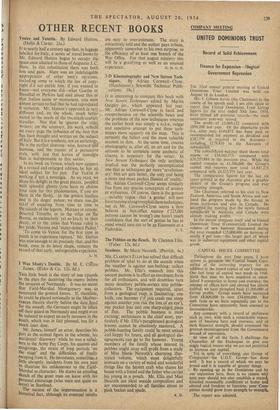OTHER RECENT BOOKS
Venice and Venetia. By Edward Hutton. (Hollis & Carter. 21s.)
IT is nearly half a century ago that, in luggage labelled for Italy, a series of travel books by Mr. Edward Hutton began to occupy the space once allotted to those of Augustus J. C. Hare. In this substitution there was both loss and gain. Hare was an indefatigable appropriator of other men's opinions, including some to which the law of copy- right did not entitle him: if you wanted to know—not everyone did—what Goethe or Stendhal or Perkins had said about this or that Italian scene or monument, you were almost certain to find that he had reproduced it verbatim. Mr. Hutton's approach is very different and, on the whole, much better suited to the needs of the twentieth-century traveller. Not that he ignores the older. writers; on the contrary, his work reflects on every page the influence of the best that has been thought and written on the subject of Italy. But it is a synthesis, not an anthology. He is the perfect cicerone: wise, learned and humane, and the master of a persuasive style, with just that leaven of nostalgia that is indispensable to this metier.
In his book on Venice, which now appears in a revised and enlarged edition, he has an ideal subject for his pen. For Venice is nothing if not a nostalgia. As we read, we share his delight in the great piazza, peopled with splendid ghosts ,(you have to choose Your time for this phenomenon, if you are there in the flesh), in the golden basilica and in the doges' palace; we share too ,the relief of escaping from time to time to the islands of the lagoon, Murano or remote, deserted Torcello, or to the villas on the Brenta, so melancholy yet so lovely in their decay, or to the cities that Venice ruled in her pride, Verona and `many-domed Padua.'
'To come to Venice for the first time in youth is to experience rapture.' Mr. Hutton was wise enough to do precisely that, and this book, even in its latest shape, remains the record of that early,'unforgettable experience.
L. M.


































 Previous page
Previous page